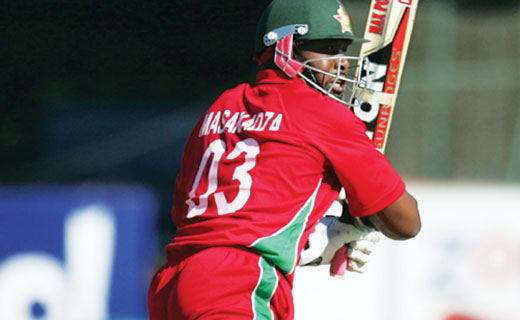
WELLINGTON – “Partying like it’s 1999” has a special meaning in Zimbabwe because it harks back to a time when things were good. That does not merely refer to the status of the country’s cricket, although it includes it.
At the 1999 World Cup in England, Zimbabwe looked like an emerging giant, but what followed was only a shrinking shadow.
Turmoil in the country touched everything from the economy to the infrastructure and the effects of the recoil are widely documented. Less so, is the brief resurgence.
Small farmers have once again begun to produce enough to sustain themselves, soon exports may follow. Cricket is slowly getting back on its feet. Soon results will come. At least that’s the hope.
Since Zimbabwe’s Test comeback in 2011, however, the numbers have not moved much. They still win around only a quarter of the one-day internationals they play. What has changed is cricket’s reach in the country.
Zimbabwe’s transformation included a forceful drive to make cricket a sport of the majority and has unearthed talent in previously unexplored areas, like Masvingo, but the player pool remains regularly at odds with the administrators.

A dispute over contracts and a tricky financial situation have deprived Zimbabwe of slick preparation and frequent competition, which the other teams have, but not dimmed their resolve. With little more than a month to go before the tournament, they appointed a new coach.
Davenell Whatmore won the World Cup with Sri Lanka in 1996 and oversaw some of Bangladesh’s biggest coups, including their victory over South Africa in 2007.
- Chamisa under fire over US$120K donation
- Mavhunga puts DeMbare into Chibuku quarterfinals
- Pension funds bet on Cabora Bassa oilfields
- Councils defy govt fire tender directive
Keep Reading
If he can do the same with Zimbabwe, he could use this tournament to show them how far they have come and how far they could go.
World Cup pedigree Zimbabwe have emerged from the group stage of a World Cup twice in eight appearances and only one of those was a result of their performance.
In 2003, Zimbabwe qualified for the Super Sixes because they were awarded points for England’s refusal to travel to their country. In 1999, they beat two major teams to advance, but things have got steadily more difficult for them.
At the last event, Zimbabwe’s only victories were over Associates and they suffered heavy defeats against Full Members. In total, they have won ten of their 51 World Cup matches.
X-factor Everybody loves a determined underdog, which is why Zimbabwe can probably count for being a lot of people’s second favourite team. The lack of expectation could take the pressure off them and cause complacency to creep into some of the opposition.
Zimbabwe may be underrated, but they have a strong core of experience and their shrewd strategies are often employed so quietly, the opposition don’t realise until it is too late.
Zimbabwe’s bowlers can be watertight containers and their batsmen’s industrious strike-rotation can see them snatch passages of play and gain an advantage.
Players in focus No longer Zimbabwe’s limited-overs captain, Brendan Taylor remains their marquée man, mostly for his ability to rise to the occasion. Taylor’s reputation is born of temperament over technique.
He can build on the smallest of foundations, can bat Zimbabwe out of crisis and anchor an innings. With two World Cups behind him and two World Cup half-centuries to his name, his experience adds to the think-tank. Oh, he can keep wicket too.
To those who only follow World Cups, it will seem like nothing has changed for Elton Chigumbura between the 2011 edition and this one. In fact, almost everything has.
Chigumbura, captain in 2011, relinquished the job to Taylor, but was reinstalled in July 2014. He now seems more ready for responsibility. If captaincy continues to bring the best out of him, Zimbabwe could have an asset in the all-rounder column, which may prove the difference.
In 13 years of international cricket, Hamilton Masakadza has not been to a World Cup. Poor form kept him out of the 2007 and 2011 events, but he has ensured it would not do the same this time.
In the 14 months from August 2013 to October 2014, Masakadza reeled off runs, averaging close to 40. While comfortable at
No Three, Masakadza can also open and provides a medium-pace option as well.
Game style Cautious approach is common from a Zimbabwean side that is often wary of being outplayed. It turns into slow scoring rates and tidy but, at times, toothless bowling.
Zimbabwe prefer slower surfaces on which they can enforce strangles and will need to adapt quickly to pitches with more pace, and quality opposition.
Prediction Without many international matches in the months leading up to the tournament and frequent waves of unhappiness in its player pool, Zimbabwe will be expected to have a tough tournament. They will be disappointed not to beat United Arab Emirates, but even a victory over Ireland will be regarded as a surprise.
World Cup stats Zimbabwe won the first match they played at a World Cup, against Australia in 1983, by a margin of 13 runs. That was also the first meeting between the two sides.
England (in 1992), India and South Africa (both 1999) are the other Full Member teams Zimbabwe have beaten. They hold the record for the most losses at the event – 37. – Cricinfo









